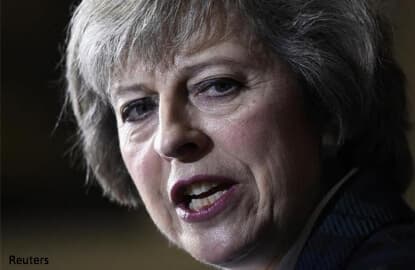
LONDON (Jan 17): British Prime Minister Theresa May said her plans for Britain's exit from the European Union mean that it could no longer remain in the single market but she would seek a deal that would take in some aspects of membership.
"What I am proposing cannot mean membership of the single market," she said in a speech in London, adding that would mean not leaving the bloc at all.
"Instead we seek the greatest possible access to it though a new comprehensive, bold and ambitious free trade agreement. That agreement may take in elements of current single-market arrangements in certain areas."
May said Britain would not seek a deal that left the country "half in, half out" of the European Union when it negotiates its exit from the bloc.
"We see a new and equal partnership between an independent, self-governing, global Britain and our friends and allies in the EU. Not partial membership of the European Union, associate membership of the European Union or anything that leaves us half in, half out," May said.
"We do not seek to adopt a model already enjoyed by other countries. We do not seek to hold on to bits of membership as we leave. No — the United Kingdom is leaving the European Union and my job is to get the right deal for Britain."
She added that she would put the final agreement on Britain's exit from the European Union to a vote in parliament.
May said there would have to compromises in the negotiations but it was important to provide "as much certainty as possible" and there would be proper scrutiny.
"When it comes to parliament, there is one other way I would like to provide certainty," she said in a speech in London. "I can confirm today that the government will put the final deal that is agreed between the UK and the EU to a vote in both houses of parliament before it comes into force."
May was setting out the principles that will guide her approach to Britain's withdrawal from the European Union.
Below are the highlights from her speech:
This agreement should allow for the freest possible trade in goods and services between Britain and the EU's member states. It should give British companies the maximum freedom to trade with and operate within European markets, and let European businesses do the same in Britain.
But I want to be clear: What I am proposing cannot mean membership of the single market.
I want this United Kingdom to emerge from this period of change stronger, fairer, more united and more outward-looking than ever before. I want us to be a secure, prosperous, tolerant country, a magnet for international talent.
I want us to be a truly global Britain, the best friend and neighbour to our European partners, but a country that reaches beyond the borders of Europe too. A country that goes out into the world to build relationships with old friends and new allies alike.
This government has a plan for Britain ... That is why, as we continue to pay the deficit down, we will take a balanced approach by investing in our economic infrastructure, as it can transform the growth potential of our economy and improve the quality of people's lives across the whole country.
(To EU nationals:) You will still be welcome in this country as we hope our citizens will be in yours.
The result of the referendum was not a decision to turn inward and retreat from the world, because Britain's history and culture is profoundly internationalist. We are a European country and proud of our shared European heritage. But we are always a country that has looked beyond Europe to the wider world. That is why we are one of the most racially diverse countries in Europe.
Our decision is not always understood by our friends and allies in Europe, and many fear the beginning of a great unravelling of the EU. But let me be clear. I do not want that to happen. It would not be in the best interest of Britain, it remains overwhelmingly and compellingly in Britain's best national interest for the EU to succeed.